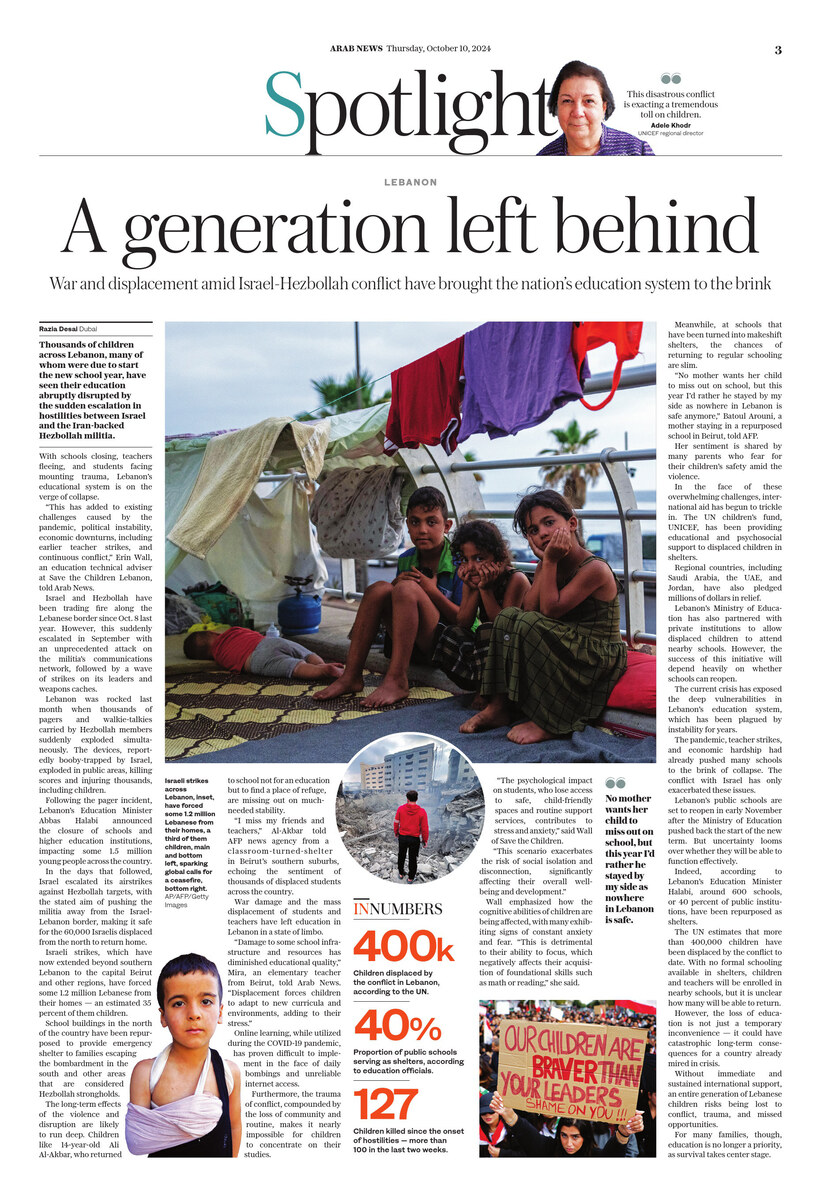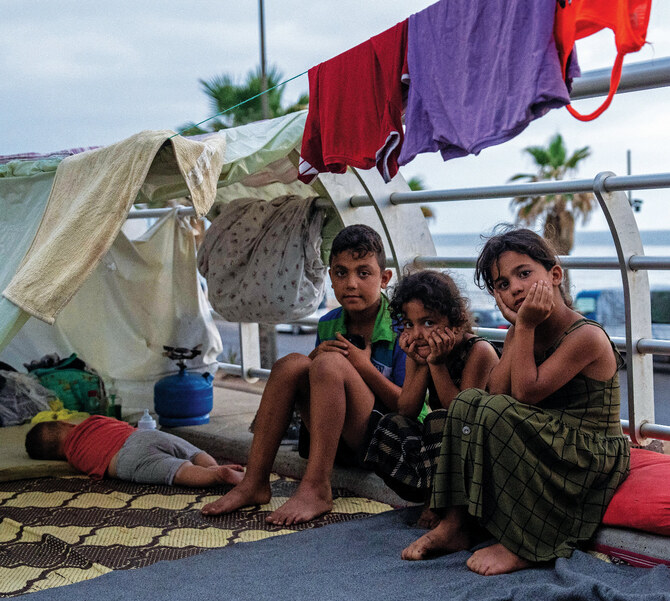DUBAI: Thousands of children across Lebanon, many of whom were due to start the new school year, have seen their education abruptly disrupted by the sudden escalation in hostilities between Israel and the Iran-backed Hezbollah militia.
With schools closing, teachers fleeing, and students facing mounting trauma, Lebanon’s educational system is on the verge of collapse.
“This has added to existing challenges caused by the pandemic, political instability, economic downturns, including earlier teacher strikes, and continuous conflict,” Erin Wall, an education technical adviser at Save the Children Lebanon, told Arab News.

Israel and Hezbollah have been trading fire along the Lebanese border since Oct. 8 last year. However, this suddenly escalated in September with an unprecedented attack on the militia’s communications network, followed by a wave of strikes on its leaders and weapons caches.
Lebanon was rocked last month when thousands of pagers and walkie-talkies carried by Hezbollah members suddenly exploded simultaneously. The devices, reportedly booby-trapped by Israel, exploded in public areas, killing scores and injuring thousands, including children.
Following the pager incident, Lebanon’s Education Minister Abbas Halabi announced the closure of schools and higher education institutions, impacting some 1.5 million young people across the country.
In the days that followed, Israel escalated its airstrikes against Hezbollah targets, with the stated aim of pushing the militia away from the Israel-Lebanon border, making it safe for the 60,000 Israelis displaced from the north to return home.

Flames and smoke rise from an Israeli airstrike in Dahiyeh, Beirut, Lebanon, on Oct. 6, 2024. Before the strike, the Israeli military told residents that they live near "facilities and interests" belonging to the militant Hezbollah group that they will strike soon. (AP)
Israeli strikes, which have now extended beyond southern Lebanon to the capital Beirut and other regions, have forced some 1.2 million Lebanese from their homes — an estimated 35 percent of them children.
School buildings in the north of the country have been repurposed to provide emergency shelter to families escaping the bombardment in the south and other areas that are considered Hezbollah strongholds.
The long-term effects of the violence and disruption are likely to run deep. Children like 14-year-old Ali Al-Akbar, who returned to school not for an education but to find a place of refuge, are missing out on much-needed stability.
“I miss my friends and teachers,” Al-Akbar told AFP news agency from a classroom-turned-shelter in Beirut’s southern suburbs, echoing the sentiment of thousands of displaced students across the country.

Displaced children sit in a classroom in Beirut, after fleeing the Israeli airstrikes in the south with their families on Sept. 26, 2024. (AP)
War damage and the mass displacement of students and teachers have left education in Lebanon in a state of limbo.
“Damage to some school infrastructure and resources has diminished educational quality,” Mira, an elementary teacher from Beirut, told Arab News. “Displacement forces children to adapt to new curricula and environments, adding to their stress.”
Online learning, while utilized during the COVID-19 pandemic, has proven difficult to implement in the face of daily bombings and unreliable internet access.
Furthermore, the trauma of conflict, compounded by the loss of community and routine, makes it nearly impossible for children to concentrate on their studies.
“The psychological impact on students, who lose access to safe, child-friendly spaces and routine support services, contributes to stress and anxiety,” said Wall of Save the Children.
“This scenario exacerbates the risk of social isolation and disconnection, significantly affecting their overall well-being and development.”
The disruption to education could also have lasting consequences for Lebanon’s recovery. A World Bank report last year estimated the economy could lose $3 million in the long term due to educational disruptions.
Even more concerning is the impact on students who may never return to school or will forget what they have already learned.
Jennifer Moorehead, Lebanon country director at Save the Children, told AFP: “It will be generations before Lebanon will recover from this learning loss.”
The country’s fragile economy is unlikely to withstand such an extensive setback, with an entire generation of children at risk of being left behind.
Children displaced by the conflict are also at risk of long-term trauma.
Wall emphasized how the cognitive abilities of children are being affected, with many exhibiting signs of constant anxiety and fear. “This is detrimental to their ability to focus, which negatively affects their acquisition of foundational skills such as math or reading,” she said.
Meanwhile, at schools that have been turned into makeshift shelters, little space remains for the continuation of education. In these overcrowded conditions, the chances of returning to regular schooling are slim.

Displaced children play in a school which provides them temporary shelter in Beirut, Lebanon, on October 7, 2024 amid the ongoing hostilities between Hezbollah and Israel. (Reuters)
“No mother wants her child to miss out on school, but this year I’d rather he stayed by my side as nowhere in Lebanon is safe anymore,” Batoul Arouni, a mother staying in a repurposed school in Beirut, told AFP.
Her sentiment is shared by many parents who fear for their children’s safety amid the violence.
In the face of these overwhelming challenges, international aid has begun to trickle in. The UN children’s fund, UNICEF, has been providing educational and psychosocial support to displaced children in shelters.
Regional countries, including Saudi Arabia, the UAE, and Jordan, have also pledged millions of dollars in relief.

Volunteers of the Russian Cultural Center entertain displaced children at a school in Beirut, Lebanon, on Oct. 3, 2024, after fleeing the Israeli airstrikes in the south. (AP)
While the aid provided thus far has primarily focused on food, shelter, and medical care, these necessities offer a glimmer of hope for Lebanon’s children.
By stabilizing the humanitarian situation, aid organizations say they are creating an environment where children can eventually return to learning and begin to heal from the trauma.
Lebanon’s Ministry of Education has also partnered with private institutions to allow displaced children to attend nearby schools. However, the success of this initiative will depend heavily on whether schools can remain open in the face of continued violence.
INNUMBERS
• 400k Children displaced by the conflict in Lebanon, according to the UN.
• 40% Proportion of public schools serving as shelters, according to education officials.
• 127 Children killed since the onset of hostilities — more than 100 in the last two weeks.
The current crisis has exposed the deep vulnerabilities in Lebanon’s education system, which has been plagued by instability for years.
The pandemic, teacher strikes, and economic hardship had already pushed many schools to the brink of collapse. The conflict with Israel has only exacerbated these issues.

Displaced people get food in a school which provides them temporary shelter in Beirut, Lebanon, on October 7, 2024, amid the ongoing hostilities between Hezbollah and Israel. (REUTERS)
Lebanon’s public schools are set to reopen in early November after the Ministry of Education pushed back the start of the new term. But uncertainty looms over whether they will be able to function effectively.
Indeed, according to Lebanon’s Education Minister Halabi, around 600 schools, or 40 percent of public institutions, have been repurposed as shelters.
“The education plan we have put in place needs more time for implementation,” Halabi said in a statement, adding that public schools will reopen based on their location and capacity to host students.
The UN estimates that more than 400,000 children have been displaced by the conflict to date. With no formal schooling available in shelters, children and teachers will be enrolled in nearby schools, but it is unclear how many will be able to return.

A protester holds a sign during a demonstration in support of Lebanese people as intense Israeli attacks across Lebanon's east, south and on southern Beirut have killed hundreds of people and forced many to flee their homes, on Place de la Republique, in Paris, on September 29, 2024. (AFP)
However, the loss of education is not just a temporary inconvenience — it could have catastrophic long-term consequences for a country already mired in crisis.
Without immediate and sustained international support, an entire generation of Lebanese children risks being lost to conflict, trauma, and missed opportunities.
For many families, though, education is no longer a priority, as survival takes center stage.



















